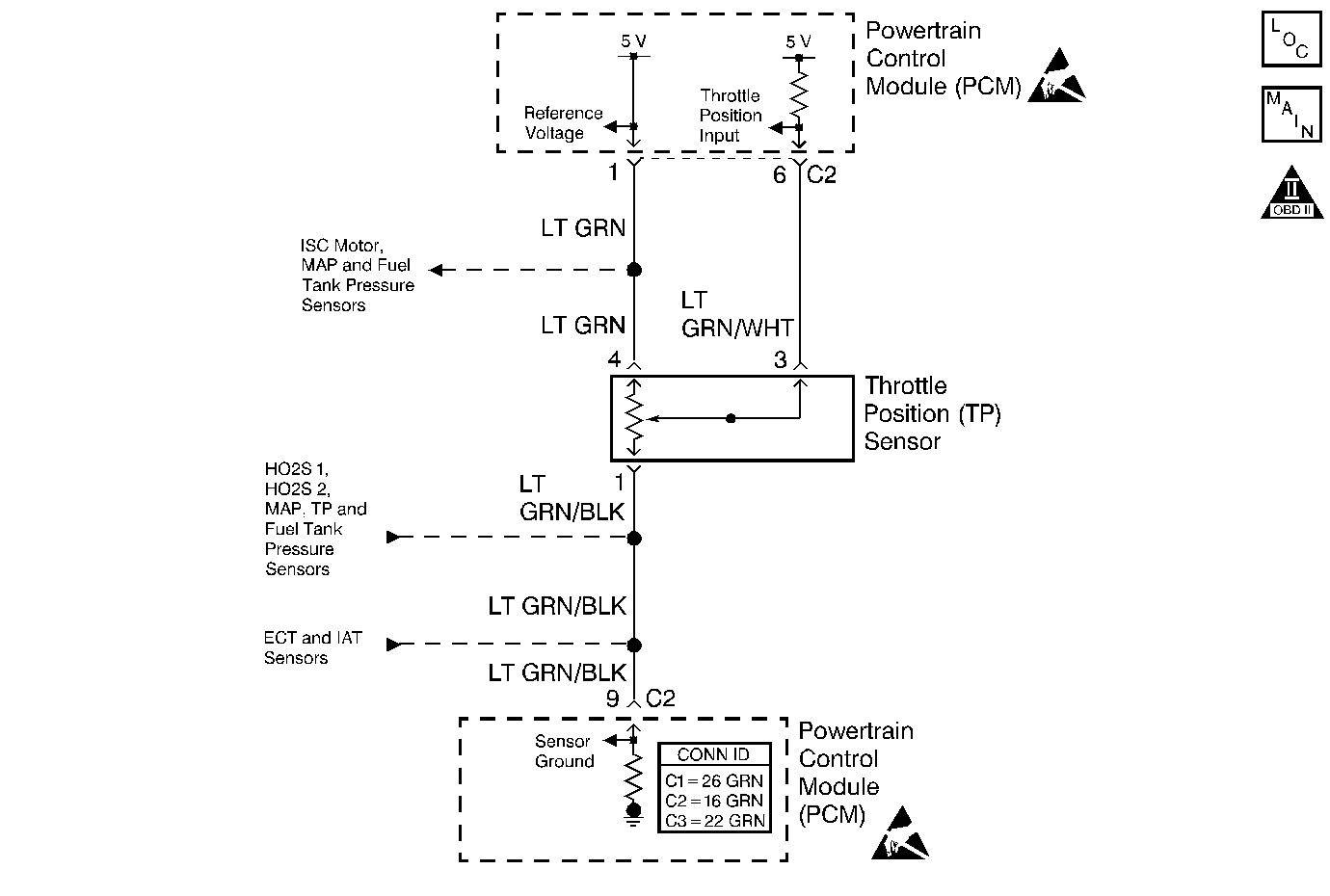
Circuit Description
The throttle position (TP) sensor contains a potentiometer whose resistance value changes with the changes in the throttle valve position. The powertrain control module (PCM) provides a 5 volt reference voltage to the TP sensor. The PCM reads the voltage across the TP sensor and converts the voltage into a throttle angle. The TP sensor resistance decreases as the throttle valve opening increases, and the TP sensor resistance increases as the throttle valve opening decreases. The TP sensor voltage being monitored by the PCM will increase as the throttle valve opening increases.
Conditions for Setting the DTC
| • | A high voltage input (throttle opening is greater than 96 percent) is indicated at the PCM with the engine running. |
| • | The above condition is present for at least 0.5 seconds. |
Action Taken When the DTC Sets
| • | The PCM illuminates the malfunction indicator lamp (MIL). |
| • | The PCM records the operating conditions at the time the diagnostic fails. This information is stored in the Freeze Frame buffer. |
| • | The PCM enters the Fail-Safe Function and assumes the throttle angle is 20 degrees while stopping ISC control. |
Conditions for Clearing the MIL/DTC
| • | The MIL turns OFF after three consecutively passing trips without a fault present. |
| • | A History DTC clears after 40 consecutive warm-up cycles without a fault. |
| • | Use the scan tool Clear DTC Information function or disconnect the PCM battery feed in order to clear the DTC. |
Diagnostic Aids
Check for any of the following conditions:
| • | A misadjusted TP sensor or a binding or stuck throttle plate may cause a DTC P0123 to set. Refer to Throttle Position Sensor Adjustment . |
| • | Check the resistance of the TP sensor. TP sensor resistance between terminals 1 and 4 should be 2.87 ohms to 5.33k ohms. TP sensor resistance between terminals 1 and 3 should be 100 ohms to 20k ohms. Replace the TP sensor if the measured resistance is not within the specified values. Refer to Throttle Position Sensor Replacement . |
| • | Check for an open ground circuit if a DTC P0108, P0113, P0118 and P0123 are set together. |
| • | A faulty electrical connection to the PCM. |
An intermittent malfunction may be caused by a fault in the TP sensor electrical circuit. Inspect the wiring harness and components for any of the following conditions:
| • | Backed out terminals |
| • | Improper mating of terminals |
| • | Broken electrical connector locks |
| • | Improperly formed or damaged terminals |
| • | Faulty terminal to wire connections |
| • | Physical damage to the wiring harness |
| • | A broken wire inside the insulation |
| • | Corrosion of electrical connections, splices, or terminals |
If a DTC P0123 cannot be duplicated, the information included in the Freeze Frame data can be useful in determining vehicle operating conditions when the DTC was first set.
Test Description
The numbers below refer to the step numbers in the diagnostic table.
-
The Powertrain OBD system check prompts the technician to complete some basic checks, and to save the freeze frame data on the scan tool if applicable. This creates an electronic copy of the data that was taken when the fault occurred. The scan tool saves the information for later reference.
-
Observe the TP sensor parameter from the closed throttle position to the wide open throttle position. The percentage of the TP sensor movement should not be more than 96 percent.
-
The TP sensor adjustment must be checked and set to specifications. Replace the TP sensor if correct adjustment cannot be made. Refer to Throttle Position Sensor Adjustment and Throttle Position Sensor Replacement .
Step | Action | Value(s) | Yes | No |
|---|---|---|---|---|
Did you perform the Powertrain On-Board Diagnostic (OBD) System Check? | -- | |||
Is the TP sensor percentage at the specified value or more than the specified value? | 96% | |||
3 |
Is the TP sensor percentage at the specified value or more than the specified value? | 96% | Go to Diagnostic Aids | |
4 |
Is the TP sensor voltage within the specified value? | 4 to 5 Volts | ||
5 | Measure the 5-volt reference from the harness side of the TP sensor to ground with the DMM. Is the voltage near the specified value? | 5.0 Volts | ||
6 | Probe the TP sensor ground circuit at the TP sensor harness connector with a test lamp connected to B+. Does the test lamp illuminate? | -- | ||
7 |
Was a repair necessary? | -- | ||
8 |
Was a repair necessary? | -- | ||
9 |
Was a repair necessary? | -- | ||
10 |
Was a repair necessary? | -- | ||
Adjust or replace the TP sensor. Refer to Throttle Position Sensor Adjustment and Throttle Position Sensor Replacement . Is the action complete? | -- | -- | ||
12 | Replace the PCM. Refer to Powertrain Control Module Replacement . Is the action complete? | -- | -- | |
13 |
Are any DTCs displayed on the scan tool? | -- | Go to the applicable DTC table | System OK |
